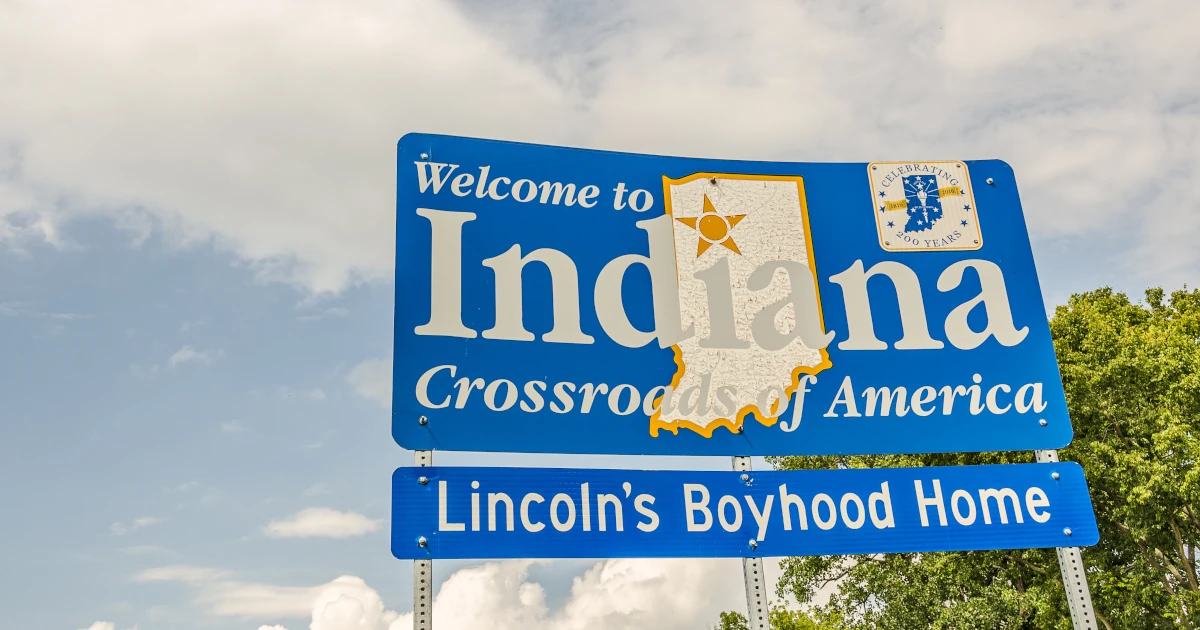
You’re setting up a new business in Indiana, and you’ve covered most of the basics. For example, maybe you have your business name, and you’re completing the Articles of Organization for your limited liability company (LLC).
You’re just missing one thing — a business license.
Or, as the case may be, several business licenses at the federal, state, local, and professional levels. Here, you’ll discover what licenses you’ll need for your business entity, ensuring you meet all licensing requirements to be in good standing with the state.
Indiana Business License: Key Takeaways
Business licenses are essential legal documents that grant permission for your business to operate within Indiana.
You may need multiple licenses at different levels of government, including federal, state, local, and professional licenses for individuals within your company.
To stay compliant and maintain your ability to operate in Indiana, you must renew and update your licenses regularly.
What Is a Business License?
Business licenses are legal documents issued by a relevant authority that essentially act as permission slips for your business. You’ll likely need licenses on the state, local, and even federal government levels. The people working for your company may also require professional licenses to show they’re qualified to do their jobs.
Unfortunately, it’s rare for there to be a catch-all business license that covers everything that you do. You’ll usually need to get a license at the state level for your business, followed by separate licenses for each city in which you operate based on the city’s local rules and ordinances.
It’s also worth pointing out that many states use “license” and permit” interchangeably. Licenses tend to be permanent, whereas permits are often temporary, but it’s a good idea to look for both to ensure your small business operates within the law.
What Does a Business License Contain?
A state license may have details about the type of business you’re running and authorization from the state of Indiana to transact in the state. The license may also carry your business name and any “doing business as” (DBA) names your company uses.
Get Your Indiana Business License in 7 Steps
Whether you have a sole proprietorship or an LLC, you may need a business license to cover your business activities. These seven steps guide you through getting the state license and additional licenses that your business needs, regardless of your business structure.
Step 1: Apply for Indiana General Business Licenses
Some states require a small business to have a general business license before it can operate. But Indiana isn’t one of them, as the state has no generic state license that all companies need to have.[1]
That doesn’t mean you won’t need any state license in Indiana, as several state agencies oversee regulatory issues that may apply to your type of business.
But when it comes to a standard state license, the law is simple — you don’t need one.
Step 2: Apply for Federal Licenses for Indiana Businesses
Federal agencies regulate some industries. If your new business falls within one of those industries, you may need a federal business license before you can do anything on the state level.
The requirements (and fees) associated with these licenses vary depending on the organization.[2] A few examples include:
Agriculture: You need a U.S. Department of Agriculture license if you intend to transport plants, animals, or similar biological matter across state lines.
Radio and TV Broadcasting: The Federal Communications Commission issues licenses for any business that broadcasts shows across radio, TV, cable, or satellite.
Firearms: You’ll need approval from the Bureau of Alcohol, Tobacco, Firearms, and Explosives (ATF) if your new business makes, sells, or imports firearms.
Having a federal license doesn’t mean you don’t have to worry about state or city licenses. For example, you may need federal, state, and city licenses to sell firearms, with your company unable to do so if you’re missing one of those three licenses.
Step 3: Search for Indiana Permits and Licenses
Just because you don’t need a general business license to transact in Indiana, that doesn’t mean your company is immune from needing a state license.
The state of Indiana has several state licenses that apply to specific industries, including licenses and permits for the following:
Adult entertainment licenses, except in cases where the business has an alcohol license from the Alcoholic Beverage Commission.
Licenses for any type of business that provides lodging for profit, including hotels, motels, and campsites.
Licensing for pawn brokers due to how they essentially offer loans on collateral, with the caveat that they can sell the collateral if their customer doesn’t repay.
You can navigate the state’s many business licenses on the INBiz website.[3]
Step 4: Search for Local County or City Indiana Business Licenses
Every city you operate in may require your company to get additional licenses, ranging from general licenses to permits and industry-specific licenses.
However, every city has its own ordinances, so you can’t carry over licenses and permits from one city into another. For instance, a building permit for Indianapolis won’t be worth anything to your company in Fort Wayne.
Here are three examples from some of Indiana’s largest cities:
Indianapolis: The city of Indianapolis has many industry-specific licenses covering everything from amusement locations and alarm companies to taxis and refuge haulage.[4]
Fort Wayne: Fort Wayne doesn’t have a general business license, though it does have several permits for which you may need to apply.[5]
Evansville: Like Indianapolis, Evansville has industry-specific licenses for sectors such as lodgings, peddling, and selling second-hand goods.[6]
Given that each city is different, the local county clerks or city tax office is usually your best starting point when determining which local licenses you’ll need. The tax office is also useful because it can also tell you if you need a sales tax permit for the city alongside any other business licenses or permits.
Step 5: Search for Indiana Professional Licenses
Professional licenses are different from business licenses. Where a business license covers the entire company, a professional license is a type of business license that covers an individual within that company.
For instance, every lawyer at a law firm needs to pass the State Bar exam, with their certificate serving as a professional license that enables them to practice law in Indiana.
You, as the business owner, may need a professional license, as may every person in your business, as well as additional state and federal licenses for the company itself. In Indiana, the Indiana Professional Licensing Agency (IPLA) handles these professional licenses via the INBiz portal.[7]
Step 6: Apply for an Indiana Home-Based Business License
Some states require you to apply for a separate business license if you run a home-based business. Examples of these companies include daycares, childcare facilities, and small e-commerce stores run out of the owner’s homes.
Indiana isn’t one of the states that require home-based businesses to have a special license. But you still need to get the appropriate state and local licenses for your new business based on your business type.
More importantly, a lack of a statewide home-based business license doesn’t mean that no cities, towns, or counties in Indiana have these licenses.
When starting your small business, speak to the city or town’s tax office to determine if you need a special license because your business location is in your home. The county recorder may also be a good source of information.
Step 7: Maintain Your Indiana Business License
You’ve handled all your business license requirements, and you’re pretty confident you can transact in Indiana. However, it’s essential to note that most cities in the state build limitations into their licenses, only allowing you to offer your business services for a set period before you have to reapply for the license.
City and state requirements often ask for regular renewal, along with the completion of forms and paying filing fees. It can get complicated, especially when no statewide catch-all information center covers everything you need to know about business licenses.
A filing service can help make staying in good standing with the Secretary of State easier for any business owner in the state of Indiana.
Apply for an Indiana Business License Online
You need a business license (or several) for your budding new business in Indiana. That means you must handle business license application processes on the federal, state, city, and professional levels, which can all start to feel too much for a business owner to handle.
Our Business License service that’s built for small business owners helps you get to grips with precisely which licenses your company needs to stay in good standing with the Indiana Secretary of State. Better yet — we handle the application process and renewals for you. To learn more, check out our Business License service today.
FAQs
How do I get a business license in Indiana?
You must apply through the relevant state authority to get a business license in Indiana, which is often the IPLA. Or, you can rely on Swyft Filings to ensure you get all of the licenses you need to transact in the state of Indiana.
Does Indiana require a general business license?
No, Indiana doesn’t have a general business license, but that doesn’t guarantee that your company won’t need any business license. You may need industry-specific and professional licenses at the federal, state, and local levels.
Can you sell things in Indiana without a license?
You may be able to sell some things, but any items subject to sales tax require a sales tax license from the Indiana Department of Revenue. You’ll receive a Registered Retail Merchant Certificate, which entitles you to collect sales tax from customers in the state.[8]
Do I need a special license for an online business in Indiana?
Indiana doesn’t have a special business license for online companies.
Can I collect sales tax in Indiana without a license?
No, you need a Registered Retail Merchant Certificate before collecting sales tax in Indiana.
How much does an Indiana business license cost?
You don’t have to pay for a general business license in Indiana. As for other licenses, fees vary depending on the type of license.
What’s the penalty for not having a business license in Indiana?
Operating without a required business license could lead to fines, financial penalties, or revocation of your ability to conduct business in your industry.
---
Bibliography
IN.gov. “Business Owner’s Guide.” Accessed July 24, 2023.
U.S. Small Business Administration. “Apply for Licenses and Permits.” Accessed July 24, 2023.
INBiz. “Indiana Business Roadmap.” Accessed July 24, 2023.
Indy.gov. “Business Licenses. “Accessed July 24, 2023.
City of Fort Wayne. “Business.” Accessed July 24, 2023.
City of Evansville Indiana. “City License & Permit Applications.” Accessed July 24, 2023.
INBiz. “Licensing.” Accessed July 24, 2023.
Indiana Department of Revenue. “Sales Tax.” Accessed July 24, 2023.

